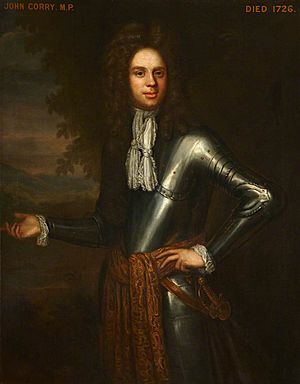John Corry facts for kids
Quick facts for kids
John Corry
|
|
|---|---|

Colonel John Corry, MP, by Thomas Pooley
|
|
| Member of the Parliament of Ireland for Enniskillen | |
| In office 1711–1713 |
|
| Member of the Parliament of Ireland for County Fermanagh | |
| In office 1719–1726 |
|
| Personal details | |
| Born | 8 January 1667 Ireland, United Kingdom |
| Died | 11 November 1726 (aged 59) Ireland, United Kingdom |
| Residences | Ireland, United Kingdom |
| Alma mater | Kilkenny College Trinity College Dublin |
| Occupation | Politician |
Colonel John Corry (born January 8, 1667 – died November 11, 1726) was an important Irish politician. He played a role in the government of Ireland during his time.
Early Life and Education
John Corry was the son of Colonel James Corry and his first wife, Sarah Anketill. His mother was the daughter of Captain Oliver Anketill.
John Corry received a good education. He studied at Kilkenny College and later at Trinity College Dublin. These were well-known schools in Ireland.
Political Career
John Corry began his public service in 1711. That year, he became the High Sheriff of Fermanagh. A High Sheriff was a top official in a county, responsible for keeping law and order.
Also in 1711, John Corry successfully ran in a special election. This election was for a seat in the Parliament of Ireland representing Enniskillen. He served as a member of the Irish House of Commons until 1713. The House of Commons was where elected representatives made laws.
In 1719, Corry was elected again, this time for County Fermanagh. This was the same area his father had represented before him. John Corry held this position as a Member of Parliament until he passed away in 1726.
Family Life
On February 7, 1702, John Corry married Sarah Leslie. She was the daughter of William Leslie.
John and Sarah Corry had a large family. They had four daughters and four sons together. Their only son who lived to adulthood was Leslie Corry. Leslie followed in his father's footsteps and also became a Member of Parliament. He represented Killybegs in the Irish Parliament.
 | Delilah Pierce |
 | Gordon Parks |
 | Augusta Savage |
 | Charles Ethan Porter |

